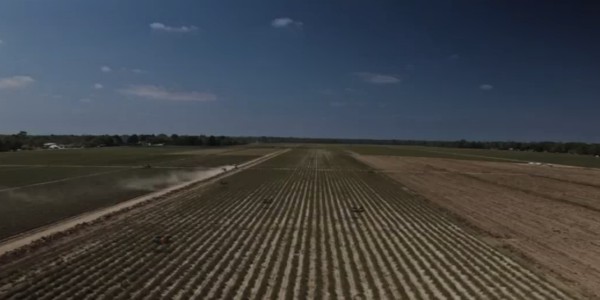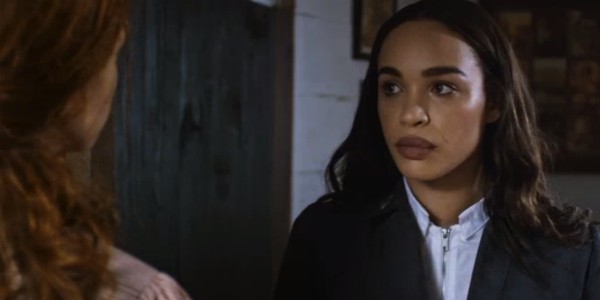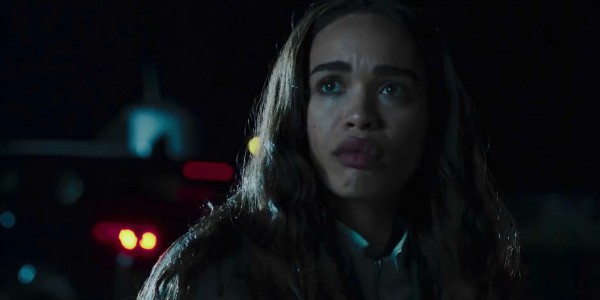HOVER: An Expertly Crafted Blend Of Horror, Sci-fi & Humanity

Amanda Mazzillo is a writer with an MFA in Dramatic…
Hover, written by Cleopatra Coleman and directed by Matt Osterman, tells the story of a too-close future where our strains on the environment have caused drastic food shortages. The film explores the lives of farmers using new agricultural drones to yield more food from their land.
We follow Claudia (Cleopatra Coleman) and John (Craig muMs Grant), two caregivers helping farmers who have recently been getting sick after the use of these new drones. John’s mysterious death sparks Claudia to uncover the truth with the help of a group of locals.
Unique and Effective World-Building
Cleopatra Coleman does a wonderful job of building a world so close to ours, yet distant in the right ways. Her script is remarkable at capturing how this future is separate from our world in subtle and natural ways. Coleman does an amazing job portraying the emotional complexities of Claudia as well as capturing natural conversations in her writing.

The darkest moments of the film hit that much harder because they come from such a realistic and relatable place. Claudia and John’s partnership is developed nicely, even in a short amount of time. Coleman’s writing works to bring us up to speed about the way this futuristic world works without feeling like exposition. Instead of simply showing us a future filled with self-driving cars, we are given a conversation between Claudia and John about not trusting technology, which sets up both the setting, as well as the personalities of the two characters.
The futuristic details were well-integrated into the story, and never made the film feel too far away from our reality, but gave a sense of the technological advances and the dangers of the future. This level of realism and subtle futuristic details makes the dark moments of the film feel that much darker.
The way Hover portrays the future manages to capture that technological advances will not benefit or drastically change the lives of people living with lower income levels. The world of the film is much more futuristic once Claudia is not in the field. Showing the difference in living conditions helps establish the disparity that has not gone away even though they are more technologically advanced. Coleman expertly blends the horror and sci-fi genres, as well as establishing a story built around humanity and taking care of one another.
A Well-Developed Plot with Surprises
Hover manages to surprise with its story, even though the audience never has a doubt that the drones are not the problem. Coleman‘s script keeps us wondering how everything fits together, even if we feel like we already know the bigger picture. Hover also wraps its various plot threads together in an interesting and believable way.
When every connection is revealed, nothing felt like it was just thrown together in hopes that it works. Every connection made sense and came together in a balanced way. Coleman created an expertly crafted script which keeps the audience engaged through its combination of tense and emotional moments as well as its more horrific moments.

Osterman’s direction helps build tension through every beat of the script. This film expertly captures tension and horror in subtle ways, while not shying away from a few well-placed bloody and over-the-top moments. This mixture captures both the horror and sci-fi genres while creating a unique and memorable experience.
An Effective and Memorable Score
One element of Hover which stands out to me is its captivating, yet never overpowering score. Wojciech Golczewski crafted a wonderful original score, which worked in perfect harmony with the film. I never once felt the score took away from the action. The intensity of the score could always be felt, yet you could also clearly hear everything happening in the foreground of the scene.

I have seen too many horror films where the loud and booming score covers up any other sound in the film. Hover did an excellent job of capturing the intensity of the film in its score without covering up anything else. The score is strong and prominent, but always knows its place in each scene.
I look forward to hearing more of Golczewski’s work in future films. His score helps set the tone for the film, and establish it as a subtle, yet tense horror film.
Hover: Conclusion
Hover is an expertly crafted horror film focusing on a future almost too close to home. Cleopatra Coleman stands out for her remarkable performance as well as for her wonderfully crafted and memorable script. Matt Osterman’s direction captures the dread of losing our humanity to the bottom line.
Are you planning on seeing Hover? Are you excited to see more horror/sci-fi films being written by women?
Hover will be released June 29th theatrically and July 3rd VOD.
https://www.youtube.com/watch?reload=9&v=P94PLpNzKiE
Does content like this matter to you?
Become a Member and support film journalism. Unlock access to all of Film Inquiry`s great articles. Join a community of like-minded readers who are passionate about cinema - get access to our private members Network, give back to independent filmmakers, and more.
Amanda Mazzillo is a writer with an MFA in Dramatic Writing from SCAD and a BA in Writing & Linguistics and Film Studies minor from Georgia Southern University. She enjoys writing comedy and exploring all forms of media. Her Twitter name is a bad pun: @mazzillofirefox













